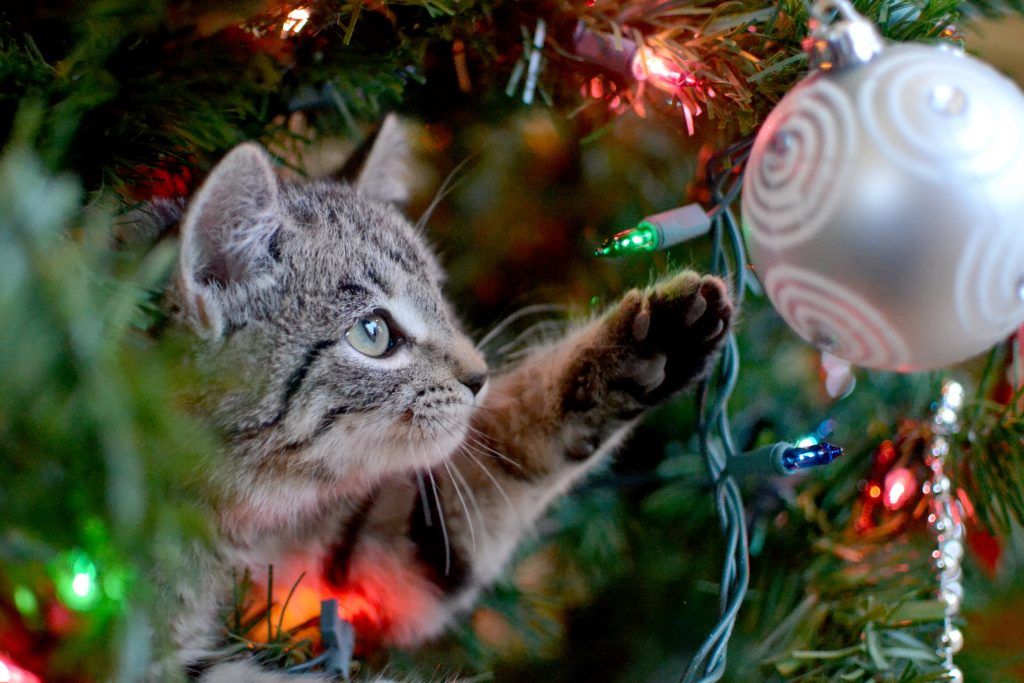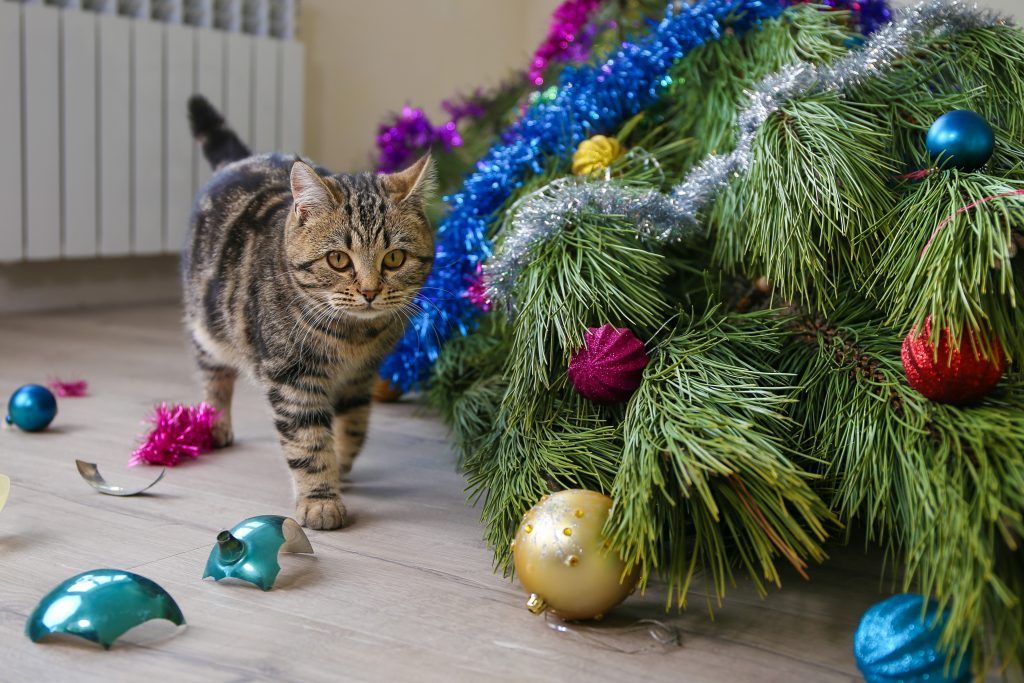One of the best parts of the Christmas season is getting a little extra time to spend with our fluffy friends. Having time off with our pets can be the silver lining of an already enjoyable season. Unfortunately, some decorations that make their way out during this time of year peak the interest of animals such as cats! In fact, most any season can be difficult for cats to deal with, as the celebration is a change in routine that can be anxiety-provoking.
How do we Keep Cats Out of Christmas Trees?
Most cats get extremely interested in holiday decorations. With this, the Christmas tree is usually the pinnacle of their curiosity. If they get too interested, though, they may try to climb, tunnel under, or straight-up tackle your tree, which can be a recipe for disaster. Additionally, all the glitter and gold of the Christmas holiday can also be a choking and digestive hazard if your cat feels like giving your decorations a taste test!
Keep reading to learn some great tips on how to keep cats out of Christmas trees!
Consider Using a Fake Tree
One common issue with cats during Christmas is they want to eat pine needles from the Christmas tree. Real trees have a tendency to drop needles, especially if they are shaken or disturbed. Unfortunately, these needles have an alluring pine scent that can often be tantalizing to cats.
Most plants that we bring in during the holidays (Christmas trees, amaryllis, and mistletoe, for example) can all be irritating or even toxic to cats. Thus, some recommend using fake trees, as they are less toxic and drop needles less frequently.
Avoid Using Shiny/Attractive Decorations

Although most people want to go all out and decorate every free surface in their home during Christmas, it can make your home less cat-friendly. Decorations, especially shiny ones such as tinsels, can seem like toys to your cat. Some cats are so interested in tinsel that they will even try to give it a taste test, which can cause digestive unrest or blockage.
Instead of using super shiny tinsel-based decorations, you may want to try using lights or some other less-edible option!
Buy a Smaller Christmas Tree
Many cat owners also experience the strange phenomenon of their cats picking fights with their Christmas tree. Regardless of your cat’s motives, this behavior can damage your tree and other decorations or, most importantly, be a risk to your cat.
Smaller Christmas trees can mitigate this risk by reducing the amount of damage that can be caused by your cat pouncing.
Fasten Your Christmas Tree to the Floor

Similar to the idea of buying a smaller tree, you may also want to fasten your tree to the floor or wall in some way. By anchoring your tree, you can rest assured that it will stay standing no matter how angry your cat is at it! Some great ideas to stabilize your tree are to use a heavy stand or to place weights near the bottom.
Secure Your Ornaments to Your Tree
Many people are concerned that they cannot have any hanging ornaments out with cats, as they are too tempting. Don’t fret, this isn’t exactly the case, as you can make efforts to secure your ornaments to the tree. By securing your ornaments, they will be harder to knock off, while still being able to show off your Christmas spirit. Some popular ways that people secure Christmas ornaments include:
- Using rubber bands to hang ornaments
- Using zip ties to secure ornaments
- Tying ornaments up with twine or string
Keep Your Christmas Lights Tight!
Let’s face it, one of the best parts of the season is getting to hang up and adore our awe-inspiring Christmas lights. Although these lights are truly beautiful, they are most certainly seen as toys by our cats. Thus, it is really important to inspect and set up your lights in a cat-friendly way.
Firstly, before you even start hanging your lights, you should inspect them to make sure they are fully intact. Ensure that there are no cuts in the cord and that all of the bulbs are smooth and unbroken. Additionally, you may want to specifically look for lights that are free of decorative elements such as tinsel and glitter, which can look especially appetizing or intriguing to cats. Lastly, it would help if you treated your lights like your ornaments and tightly secure them to your tree. This will prevent your cats from using them as their personal tightrope!
Hang Your Ornaments High Up
Although it may sound counterintuitive, hanging your ornaments high on your tree can prevent them from becoming your cat’s next favorite toy. If your ornaments are well out of reach, your cats will be less likely to bat them around. Thus, most people opt to place them at the top of their Christmas tree. With that said, your ornaments may be more susceptible to your tree falling if they are placed near the tip of the tree. Nevertheless, using some of our previous tips on securing your tree can mitigate those risks!
Entertain Your Cat
Just like kids, cats can become extremely bored and restless if they are not regularly interacted with. This boredom can be seen in destructive or curious behavior, such as beating around ornaments or jumping on the tree. One way to reduce the amount of damage your cat causes around the holidays is to schedule some daily playtime with them. This will ensure that they are mentally and physically occupied every day.
Give Your Cat Time to Adjust
Some things involving our pets are simply out of our control. With this, our cats usually need some good adjustment time when things change around the house. This is especially true when one of their only comfortable living spaces transforms into a winter wonderland overnight! With this, you may want to give your cat a week or so to gradually adjust to the new space. This can help alleviate some of their anxiety, which may reduce some of their destructive behaviors.
























